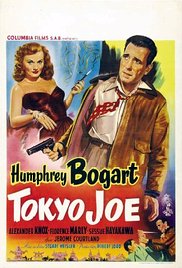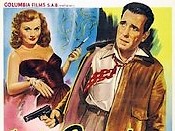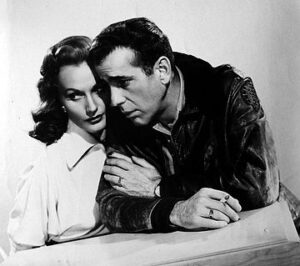Tokyo Joe *** (1949, Humphrey Bogart, Florence Marly, Alexander Knox, Sessue Hayakawa, Jerome Courtland, Gordon Jones) – Classic Movie Review 5,068
Humphrey Bogart stars in the 1949 film noir crime thriller Tokyo Joe as American veteran Joe Barrett, who returns to Tokyo after World War Two to try to resume his life as part-owner of a jazz bar.
Director Stuart Heisler’s 1949 American film noir crime thriller film Tokyo Joe stars Humphrey Bogart as American Air Force veteran Joe Barrett, who returns to Tokyo after World War Two to try to resume his life as part-owner of a jazz bar, Tokyo Joe’s.
But he find that his one-time singer wife Trina (Florence Marly) he thought dead is alive and has divorced him and married a shady lawyer, Mark Landis (Alexander Knox). Bogart also finds he has a seven-year-old daughter, and to stay in Japan, he starts an air freight service. Then a creepy secret agent, Baron Kimura (Sessue Hayakawa), blackmails Bogart into smuggling war criminals into Japan by revealing that Trina made treason propaganda broadcasts in the war.
With a screenplay by Cyril Hume, Bertram Millhauser and Walter Doniger, based on a story by Steve Fisher, this is a complex and intriguing but muddled story with a gloomy tone and dodgy politics.
Bogart seems subdued in an over-restrained performance, though of course he remains highly watchable as always, and he cannot quite summon up the ghost of Casablanca, as this film so obviously means to. And Bogart has not got the hauntingly effective kind of supporting performances he needs to shine.
Bogart executive produced for his own company, Santana Productions.
The song These Foolish Things (music by Jack Strachey, lyrics by Eric Maschwitz and Harry Link) is nearly as good as Casablanca’s As Time Goes by, though. These Foolish Things is sung several times on a record and by Marly at the Tokyo Joe’s bar in flashback and it is reprised at the cabaret.
Overall, the film is worth a look as an interesting, rarely screened, minor effort from Bogart.
Also in the cast are Jerome Courtland, Gordon Jones, Teru Shimada, Hideo Mori, Charles Meredith, Rhys Williams, Lora Lee Michel, Hugh Beaumont, Whit Bissell, Tommy Bond, James Cardwell, Gene Gondo, Harold Goodwin, Otto Han and Harlan Warde.
It is the first of Heisler’s two films with Bogart: Chain Lightning was also shot in 1949 but was not released till 1950.
Tokyo Joe is directed by Stuart Heisler, runs 89 minutes, is produced by Santana Productions, is released by Columbia Pictures, is written by Cyril Hume, Bertram Millhauser and Walter Doniger (adaptation), based on a story by Steve Fisher, is shot in black and white by Charles Lawton Jr, is produced by Robert Lord, Henry S Kesler and Gene Towne, is scored by George Antheil and Harry Link, and is designed by Robert Peterson.
Principal filming took place from January 4 to the end of February 1949 on the Columbia Pictures studio lot rather than location in Tokyo, though Columbia sent a second unit to Tokyo for exterior shots, as the first movie company allowed to film in postwar Japan.
It was released in November 1949.
Santana Productions was founded in 1948 by Humphrey Bogart, named after his yacht as well as the cabin cruiser in his 1948 film Key Largo. The company released its films through Columbia Pictures, but most of its films lost money, forcing its sale after 1953.
The cast are Humphrey Bogart as Joe Barrett, Alexander Knox as Mark Landis, Florence Marly as Trina Pechinkov Landis, Sessue Hayakawa as Baron Kimura, Jerome Courtland as Danny, Gordon Jones as Idaho, Teru Shimada as Ito, Hideo Mori as Kanda, Charles Meredith as General Ireton, Rhys Williams as Colonel Dahlgren, Lora Lee Michel as Trina’s daughter Anya, Kyoko Kamo as Nani-San, Gene Gondo as Kamikaze, Harold Goodwin as Major J.F.X. Loomis, James Cardwell as Military Police Captain, Frank Kumagai as Truck Driver, Tetsu Komai as Lt. General ‘The Butcher’ Takenobu, Otto Han as Hara, Yosan Tsuruta as Goro, Hugh Beaumont as Provost Marshal Major, Whit Bissell, Tommy Bond, Gene Gondo, Otto Han and Harlan Warde.
Sessue Hayakawa was in France from 1937 to 1949. After joining the French Resistance, he aided Allied flyers during the World War Two. The American Consulate investigated Hayakawa’s activities during the war before issuing a work permit.
Tokyo Joe was released on VHS in 1989 and on DVD in 2004.
© Derek Winnert 2017 Classic Movie Review 5,068
Check out more reviews on http://derekwinnert.com




